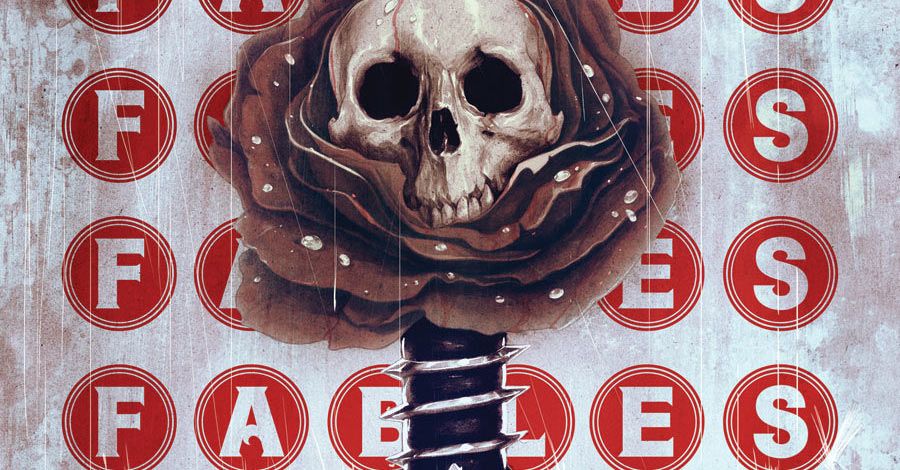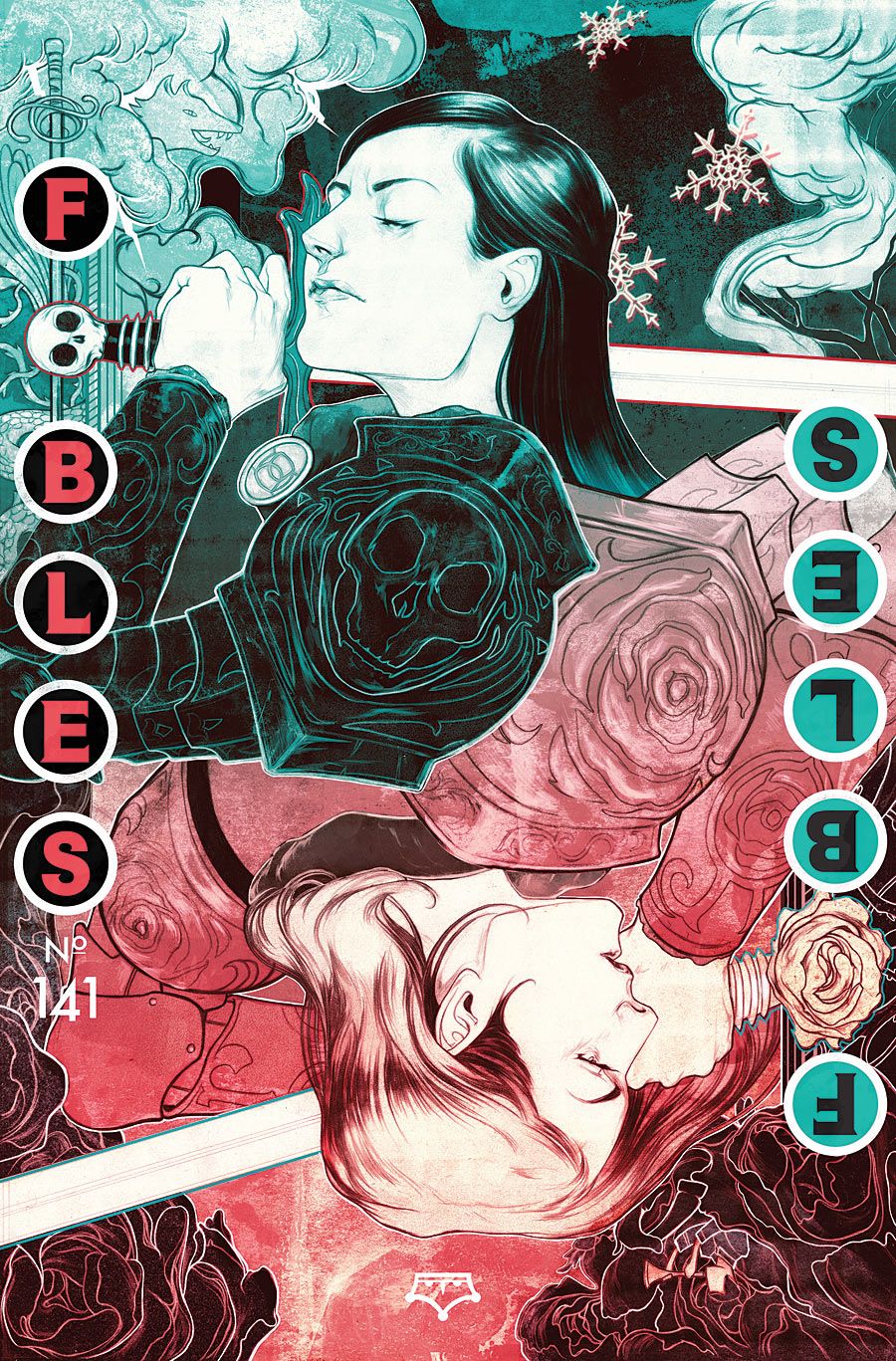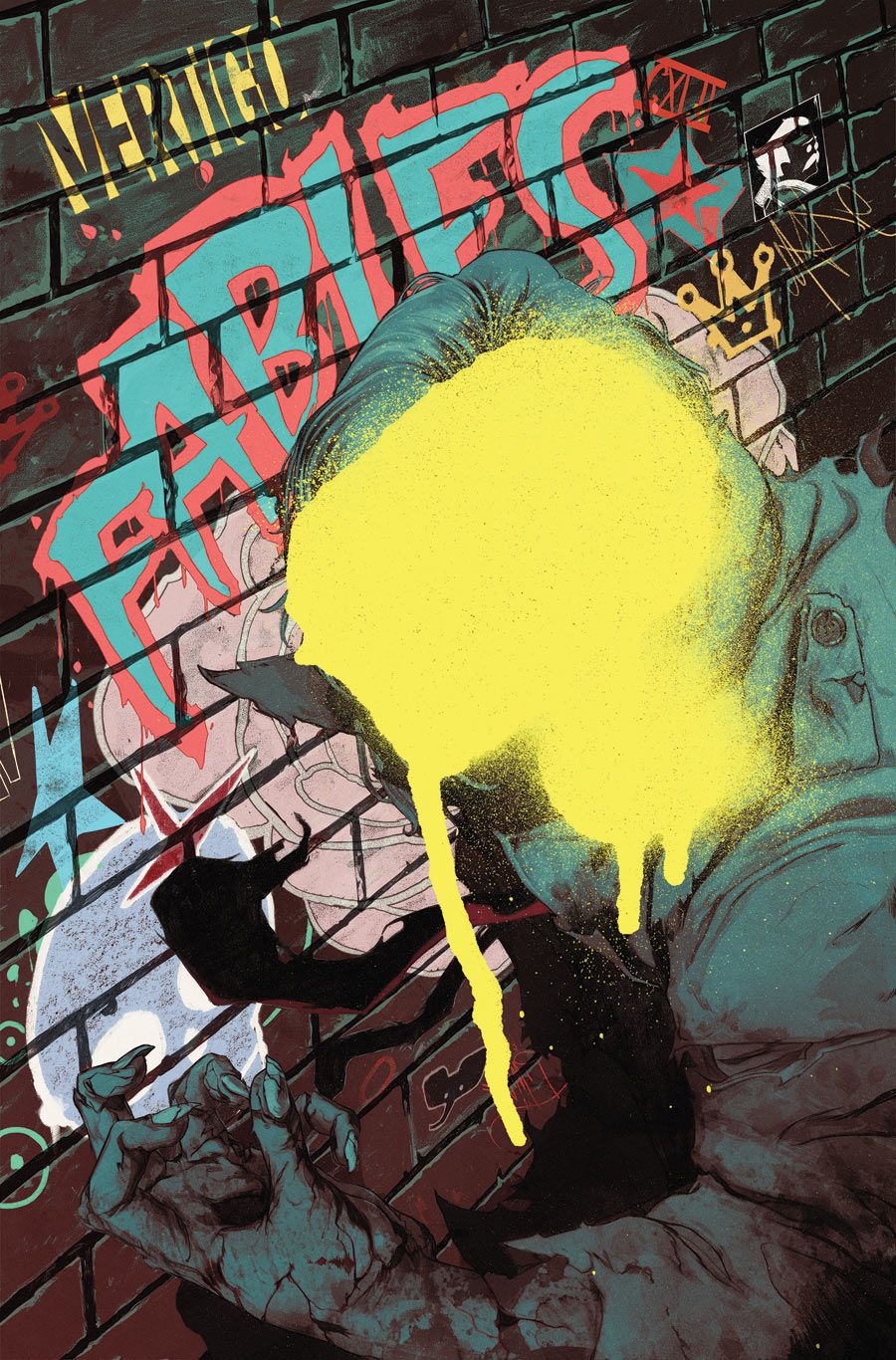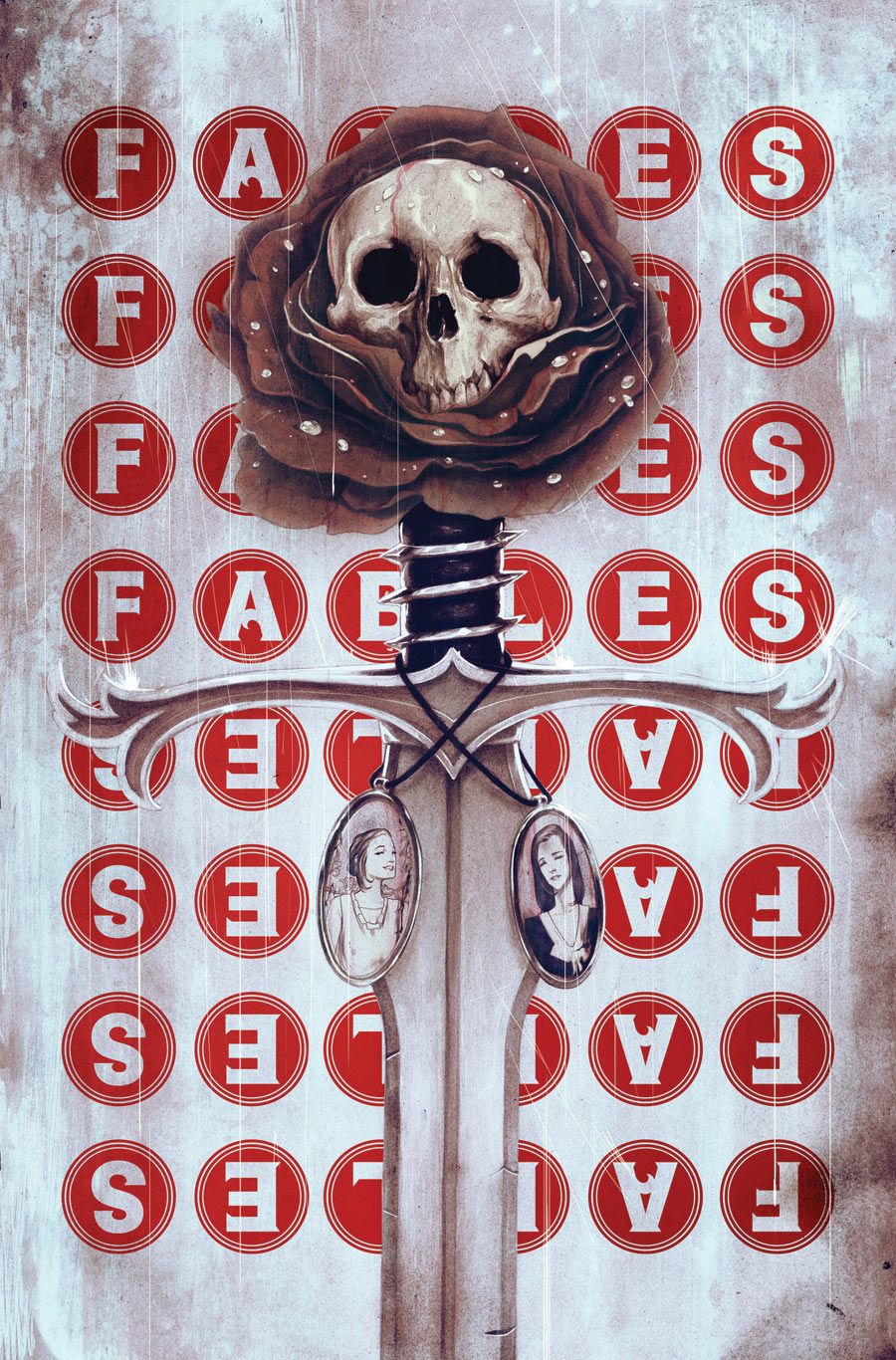While discussing the final arc of his multiple Eisner Award-winning series "Fables" with CBR News, writer Bill Willingham was sharing his thoughts on Fabletown -- the fictional home to the fairy tale characters that he and artist Mark Buckingham have reimagined since Vertigo launched the series in 2002. In explaining the similarities between Fabletown and a refugee camp (or even a wartime foxhole), Willingham included himself amongst those being transplanted as "Fables" comes to a close in early 2015.
"Some romances began there [Fabletown], some lifelong friendships were forged there, and just the idea that every single one of us had to rely on every single one of us against a common enemy, that's just hard to give up," Willingham mused.
The 'us' in the preceding quote makes perfect sense, as Willingham has lived and died (and lived again) alongside these characters for the past 140 issues. And with just ten more to go, there is little doubt that he will feel the accompanying joy -- and pain -- just as much as Snow White, Rose Red and (hopefully) Bigby Wolf as his epic adventure draws its final curtain.
RELATED: Buckingham Guides "Fairest," "Fables" To Their Happily Ever Afters
Willingham also shared his thoughts on the upcoming battle between good and evil, including which sister is on which side, why mistreating Rose Red makes him extra uneasy and how, despite everything being laid out on the table, there are still many answers -- and maybe even more questions -- left to be revealed in "Fables" final arc, appropriately titled "Happily Ever After."
CBR News: With just 10 issues left, one final arc, are there any regrets or thoughts that you may be ending "Fables" too early?
Bill Willingham: Comics is not a business in which there is a lot of job security. But in the 10-plus years we've been doing "Fables," it's come as close as that in my career and my life as I've ever enjoyed. There are some regrets along that line. The question is, "What am I thinking? Why kill the goose that's laying the golden eggs?"
The other regrets are emotional ones. I am a fan caught up in the story, as well. And you don't want to see something that's been that important to you for that many years just go away. At the same, there is a little bit of a sense of relief. There is a lot of pressure every month to make "Fables" as good as I possibly can. Ten years of keeping all of those plates spinning without dropping any -- it will be nice to take a break for a while. So yes, there are mixed emotions.
Have you enjoyed writing this last arc, or has it been painful?
For the most part, I am enjoying writing. The last story arc is so complex, though, and there are so many moving pieces to this that every day of work brings with it some anxiety that I am forgetting something crucial. Not only do the pieces have to be all accounted for, they have to be done in the right order since we are still doing this as serial fiction. These books have to come out. You can't wait until all 10 are done and go through it and make sure that everything is in place and then start to release them. We have to get it absolutely right. We have to make sure that this scene is in this issue so that two issues away, when this issue comes up again, it all makes sense. And that complexity is a little daunting. The pressure is pretty high.
But the joy of doing this -- except for all of the characters that I am going to maliciously destroy over the next couple of months -- is pretty vast. [Laughs] The "maliciously destroying" part is probably a little tongue-in-cheek. We'll see if that happens.
Have you become a better writer since "Fables" #1 arrived in stores on May 8, 2002?
Oh, I hope so. If I haven't, then I've been doing it wrong. To a certain extent, anything that you do every day for 10 or more years, you either have to be getting better at it or there is something horribly, horribly wrong with what you are doing. I think my instincts about what needs to go into any given issue to be fair to the readers and have them buy the next issue and not feel cheated at the end of it, that instinct has been honed a little bit. And certain practical aspects have also been honed. I used to work very hard at the beginning of an issue, making sure that by page 20 everything that I wanted to get into this issue is going to get in there. I used to work very hard on the page by page structure. Nowadays, the ability to know that I am going to be able to get things in by the end of the issue has been hardwired in. Now, I just start writing on page 1 and usually bring it in by the end -- sometimes there's some squeezing and adjustments required.
In terms of what makes a good story, I think the artistic aspect of it is something that you have to prove to yourself each and every time because it has to be -- I'm trying to avoid using the word "unique," because everyone keeps saying that there are no unique stories anymore. It's all been done, but there are unique takes on the seven or fourteen base stories that everyone claims exist. The ability to do that is always in question, because you can't really use the same story over and over again or it would get pretty boring. Therefore, you have to come up with new solutions each and every time. In that case, I think every issue's approach is as a rank amateur who has to relearn this from the start again.
You've told me in the past that you've always had an endgame in mind for "Fables." As this all comes to a close, has that changed at all as you have been writing this final arc?
There have been some changes. Some of them have been structural changes, because it's a very complex plot. We've had to adjust things here and there to make the big stuff work. The big, larger-than-life events that are planned for this last arc have pretty much stayed as they were conceived. Some of the bit parts, some of the minor characters have to change their roles here and there to make it all work more efficiently. And then, sometimes we just add interesting ideas -- things that just didn't quite occur when we were working on the big, sweeping arc of the story.
The other things that changed happen when it's time to finally write the last bit with this specific character and after that, I'm going to be done and never revisit that character. There are many moments like that coming up. There is part of me that wants to veer off and jump out of the car at the last minute before it goes off the cliff. "We'll save you for later." That was a metaphorical example by the way. At least to my knowledge, there are no scenes where a character is in a car going off a cliff. That's just an example.
The marquee for this final arc boasts: Snow White v. Rose Red. We spoke a few years back, right before the "Snow White" arc, about your love of Snow as a leading lady. What is it about Red that makes her a character worthy of sharing the spotlight with Snow in "Happily Ever After?"
To a certain extent, I have favored Snow over Rose Red throughout most of the series. Snow is the competent one, the one that you can rely on through thick and thin. There are real characters like that in real life -- the ones that you can just rely on -- and then there is the fun, exciting characters, which are often unreliable. Most every family has their black sheep.
When I was kid, I always got excited to hear the next story about my Uncle Dick. He's my mother's brother. "Was he in jail this time?" "Was he divorced again?" "Married again?" "Did he blow the roof off of any buildings under construction again?" It was perpetual. Rose Red is an exciting character for exactly that reason.
Snow White is steadfast and solid. Rose Red is mercury and water and probably spilled booze. She is just a hot mess, and it's exciting to have those kinds of characters.
At the same time, as we discussed so long ago, Snow White is visually based on my ideal woman or my archetype. Rose Red became visually based on Mark Buckingham's beloved wife, so she really became his character. If we had to choose, Snow's mine and Red is Mark's. This became a disaster at times. I've felt guilty lately about doing these things to someone that is now, at least in some ways, aligned as Mark's beloved wife. I think I've been easier on her because of that. [Laughs] She and Snow have been getting along so well now, for so long. But we've been letting them get along for a while because we're setting it up for the next fallout, which is going to be heroic in its scope. The next big spill is going to be the biggest one.
Snow and Red are two larger than life characters, and they are sisters. They are polar opposites. The whole "Snow White and Rose Red" fairy tale is that they were two sides of the same coin. The adversarial nature that they've had off and on really has been building all along, to this final arc. You have enemies in war, and sometimes you can even respect them, but to really get down and really hate someone, I find that it helps if it's someone you loved, and perhaps loved dearly, before. No one can let you down and betray you like someone you counted on and trusted. The big scrap coming between them is going to be bigger than any hate-fest that we've seen before.
This far into the answer, I have no idea if I've answered your question, but I hope I have.
Oh, you have. "Happily Ever After" is also billed as a battle of good and evil -- but which one is the good and which one is evil?
As a matter of fact, we purposely blurred the line between good and evil. We're doing the Camelot story and, as everyone knows, good King Arthur falls in love with and marries good Queen Guinevere, who loves him dearly -- and then the third part of the triangle comes in and ruins it. Lancelot comes along, and he's not evil -- as a matter of fact, he's King Arthur's best friend. There is just this desire to get away, and it causes the terrible corruption of this wonderful thing in Camelot. And then, King Arthur sows part of his own destruction by sleeping with his half-sister and having a bastard child. Your flaw always turns out to haunt you in the end, right?
The problem is that we have Rose Red in the King Arthur role. And Rose Red did not come into the King Arthur role as pure and noble and steadfast as King Arthur. She finds herself surprised to be in that role. Snow White is being cast as the villain, here -- the half-sister, in this case the full sister, who ruins everything. But as we know, Rose Red is the one who is more likely to ruin it all, and Snow White is the one that we've established as the steady, bedrock character. Why are they in the opposite roles, especially when they've been warned that they are in these opposite roles? They are fighting against letting this same template play out. In doing that, we get to take a really good look at the question, is there such a thing as a natural evil -- an evil imposed regardless of what you try to do? Or is it something that has to be in your own soul and character? I don't know if we will resolve that, but we get to play with those themes throughout this final arc, hopefully in fun and interesting ways.
Speaking of evil, for me, the greatest trick you ever pulled was casting one the all time greatest villains -- the Big Bad Wolf -- as your leading man. Does Bigby Wolf return for this final arc?
That's a hard question to answer, because as far as we know, Bigby's dead. We've seen him having a scene with Boy Blue, and Boy Blue is on his way to some afterlife and leaves the series permanently. We've seen Bigby in the afterlife as a dead wolf in his forest. Granted, some merry prankster got into that script and teased that there might be a way back. But I don't know who added those lines. [Laughs] That said, if he could come back, considering the series is wrapping up, now would be a good time to do it, don't you think?
Camelot has always been cast as a utopian state before its fall, and I love this line at the end of "Fables" #140. "And that's how Fabletown was ultimately destroyed. By the idea of why it was created in the first place. To leave someday when they could all go home." Was Fabletown a perfect place, like Camelot, but now it's just time to leave?
Perfect? No. I think any refugee camp, by definition, is not perfect. It is the best we can do. Fabletown was always created to be temporary, just something that we just muddled through until we got to go home again. So no, never perfect, but I think there are going to be some regrets because it was home to so many characters for centuries -- literally centuries. You don't leave a place like that, regardless of the fact that it was meant to be temporary all along, without some regrets. Some romances began there, some lifelong friendships were forged there and just the idea that every single one of us had to rely had to rely on every single one of us against a common enemy, that's hard to give up. It's like when a war is over and you're going home. Every soldier wants to go home. But at the same time, you are leaving people that you bled with and fought with and trusted -- it's hard to leave those guys. That's the essence of Fabletown. It's the people you shared a foxhole with for a long, long time. There are regrets, even though there is joy that you are finally going home.
"Fables" #141, by Bill Willingham and Mark Buckingham, is available now.




